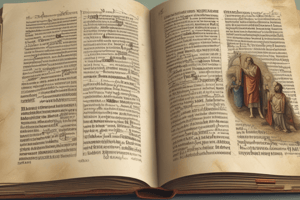Podcast
Questions and Answers
Jesus has expressed remorse for his thoughts, words, or actions.
Jesus has expressed remorse for his thoughts, words, or actions.
False (B)
The author has been walking with the Lord for 30 years and claims to have mastered faith.
The author has been walking with the Lord for 30 years and claims to have mastered faith.
False (B)
The Book of James emphasizes the importance of showing one's faith through actions.
The Book of James emphasizes the importance of showing one's faith through actions.
True (A)
The overall percentage of the global population holding a college degree is notably high.
The overall percentage of the global population holding a college degree is notably high.
A degree guarantees that an individual will be wise or a man of God.
A degree guarantees that an individual will be wise or a man of God.
Being led by the spirit is significantly discussed in the Book of James.
Being led by the spirit is significantly discussed in the Book of James.
The author claims to have mastered every test faced in their spiritual journey.
The author claims to have mastered every test faced in their spiritual journey.
The statement emphasizes the importance of pursuing worldly knowledge over spiritual wisdom.
The statement emphasizes the importance of pursuing worldly knowledge over spiritual wisdom.
Wisdom can be quantitatively measured and compared to the educational achievements of others.
Wisdom can be quantitatively measured and compared to the educational achievements of others.
The text implies that all Christians are perfect and do not experience failures.
The text implies that all Christians are perfect and do not experience failures.
Flashcards are hidden until you start studying
Study Notes
The Book of James
- Considered the first book of the New Testament, likely written in the early 30s AD.
- Directly addresses Jewish Christians, not the wider nation of Israel.
- Designed as reminders and tests for those who profess faith in Christ, focusing on living out that faith.
Audience and Context
- Written to Jewish Christians, referred to as Messianic Jews, acknowledging the coming of the Messiah.
- Emphasizes an Old Testament foundation and the Jewish mindset in understanding faith and wisdom.
- Not a conversion message, but guidance for those who have already accepted Christ.
Key Themes in James
- Faith must be demonstrated through actions, contrasting knowledge without application.
- Wisdom is portrayed as knowledge in action, leading to proper conduct rather than mere accumulation of information.
Biblical Wisdom
- Distinction between wisdom of God (pure, peaceable, gentle) and worldly wisdom (earthly, demonic, self-serving).
- Wisdom must manifest in thought, speech, and actions, implying a holistic approach to living out faith.
- References the Jewish concept of wisdom rooted in Old Testament teachings, especially evident in the Book of Proverbs.
Proverbs and Wisdom
- Proverbs chapters 1-9 provide a microcosm of wisdom, contrasting wise behavior with folly.
- Key sayings emphasize the importance of fearing the Lord as foundational to wisdom and understanding.
- Wisdom is personified, actively calling for attention in everyday life, while folly does likewise.
Practical Applications
- Encourages believers to seek wisdom actively through God's Word, highlighting the necessity of understanding and proper behavior.
- Stresses that wisdom must translate into real-life actions, revealing genuine faith in practice.
- Discusses how wisdom is intertwined with one’s character and moral integrity, affecting how one engages with others.
Conclusion
- The Book of James serves as an early Christian manual for living out faith, prioritizing genuine actions reflective of one’s beliefs.
- It invites a reflective approach to wisdom, urging believers to assess how their faith translates into their daily lives and conversations.### Wisdom and Understanding in Scripture
- The process of acquiring wisdom and understanding is vital, emphasizing the importance of not conforming to worldly standards.
- Wisdom is personified as a woman, stressing the need to embrace and value her; forsaking wisdom leads to vulnerability.
- The essence of wisdom is acquiring it actively, recognizing it as an ongoing journey rather than a static state.
Old Testament Wisdom
- Proverbs highlights that the beginning of wisdom starts with the pursuit of wisdom itself.
- This pursuit brings honor and rewards, such as peace and beauty.
- Wisdom is described as better than valuables, stressing eternal significance over temporary material gain.
New Testament Connection
- Jesus exemplifies the wisdom found in the Old Testament, fulfilling the qualities of wisdom through His actions and teachings.
- In Galatians, Jesus is noted as being born under the law, indicating His authority and adherence to Old Testament wisdom.
- The term "Sophia" (wisdom in Greek) connects to the concept of being sophisticated and relates to practical living.
Jesus' Wisdom
- In Matthew, wisdom is vindicated through deeds, showing that true wisdom is reflected in one's actions.
- Jesus refers to Himself as greater than Solomon, highlighting His divine wisdom amidst human limitations.
- Wisdom is a key component of His teachings, and He embodies the ultimate expression of God's wisdom.
The Role of the Holy Spirit
- Isaiah prophesies about the Spirit of the Lord resting upon the Messiah, signifying divine wisdom.
- The wisdom of Jesus is presented as an anointed wisdom, not merely academic but spiritually profound.
Sources of Wisdom
- In James, contrasting sources of wisdom are defined: wisdom from above (pure, peaceable) versus earthly wisdom (selfish ambition, disorder).
- Believers are taught to pursue godly wisdom, which leads to good behavior and gentleness rather than strife.
Paul’s Teachings on Wisdom
- The Apostle Paul contrasts worldly wisdom with God's wisdom, stating that true understanding comes from Christ.
- Wisdom in Christ is foundational for faith, as it empowers believers through the Spirit rather than human eloquence.
Colossians and the Treasure of Wisdom
- Paul emphasizes that all treasures of wisdom and knowledge are hidden in Christ, asserting that true understanding comes from Him.
- The Book of Colossians encourages believers to seek wisdom through Christ's teachings and God's revelation.
Conclusion on Wisdom
- Wisdom is a continuous pursuit, requiring humility and acknowledgment of one's limitations.
- Believers are called to reflect God's wisdom in thought, speech, and action, aligning with the calling to live out one's faith actively.### Wisdom vs Folly
- Folly rarely identifies itself as folly; it presents itself as wisdom, misleading others.
- Colossians 2:23 emphasizes that appearance of wisdom does not equate to true wisdom.
- True wisdom must align with God's Word; societal approval is insufficient for discernment.
The Role of Scripture
- Colossians 3:16 encourages dwelling in the Word of Christ with wisdom, teaching, and encouraging one another.
- Wisdom reflected in actions is indicative of the Word of God manifesting in life.
Understanding Jesus' Wisdom
- Jesus exemplified wisdom and passed every test of God's wisdom during His earthly life.
- His responses to temptation and interactions with others demonstrated complete adherence to God’s Word.
- Self-control was a consistent aspect of His character, contradicting cultural maxims about love and relationships.
The Book of James
- The Book of James serves as a reality check, urging sincerity in actions as evidence of faith.
- Self-examination is crucial; the letter challenges complacency, emphasizing action over mere hearing.
- It highlights the discrepancy between human efforts and the perfect wisdom exemplified by Jesus.
Personal Reflections
- Individuals often fall short in demonstrating wisdom consistently, needing continual reminders and lessons.
- Acknowledging failure is part of spiritual growth; ongoing learning is essential in faith journey.
Education and Spiritual Wisdom
- Possessing advanced degrees does not guarantee wisdom or spiritual maturity.
- Wisdom must be cultivated in alignment with God's principles, regardless of educational background.
Final Thoughts
- Whether in ministry contexts or personal faith, true wisdom and understanding require a commitment to Scripture and active application in life.
Studying That Suits You
Use AI to generate personalized quizzes and flashcards to suit your learning preferences.




